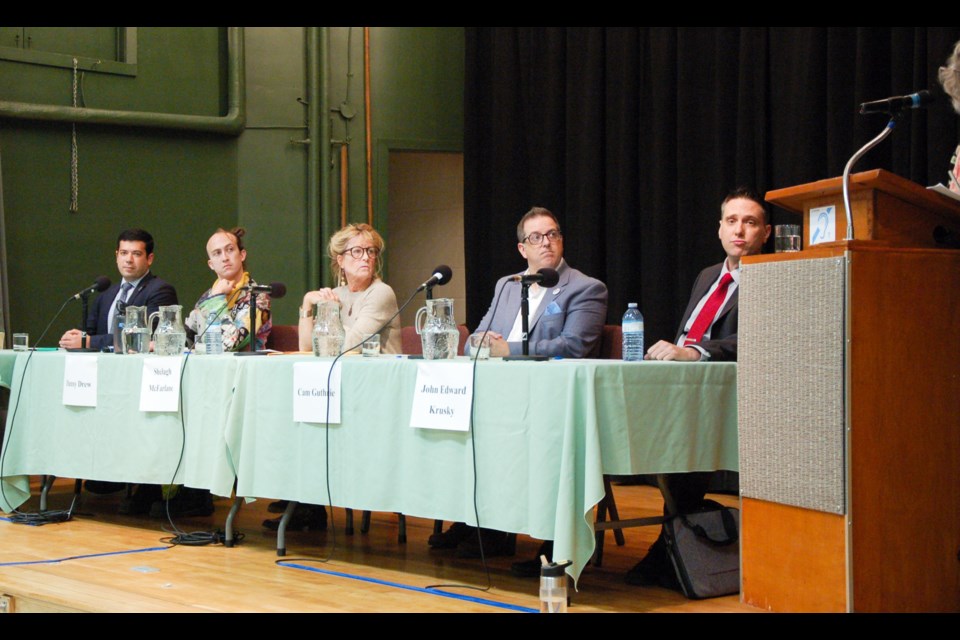Is it time for new ideas to address lingering issues in the community such as poverty and homelessness or is this the time to stay the course?
That’s the question mayoral candidates who participated in an election forum on Tuesday evening ultimately asked of prospective voters.
Faced with questions about how to address poverty, homelessness, climate change, community safety and more, incumbent candidate Cam Guthrie largely pointed to work that’s already been done or is in the process of being organized, while challengers called for a variety of changes aimed at improving the lives of struggling Guelphites.
“When rough waters hit, you need to make sure you have a strong foundation on how to move forward on the different issues that come forward in our community,” Guthrie told the audience at Dublin Street United Church, where the event was organized by the justice and outreach committee.
Chief among the targets of challengers were the state of transit and active transportation in the city, which candidates tied in to questions about community greenhouse gas emission reductions, poverty, jobs and housing affordability.
“We need to stop designing the city around personal vehicles,” commented candidate Danny Drew, calling the current transit system “crap” that’s undependable to help people get around.
They called for free transit for everyone to encourage people to give up their personal vehicles, in addition to closing off downtown to vehicle traffic entirely, with more bicycle racks.
John Edward Krusky urged the creation of bus and taxi-only lanes to make transit speedier and more dependable.
William Albabish noted he’s felt safe riding his e-bike in various cities, but not Guelph.
“This city is a disaster waiting to happen,” he said, referring to the need for more protected lanes for active transportation and more timely street sweeping.
Getting around the city could also be made easier by ensuring construction projects such as the ones underway now on Victoria Road and Gordon Street, which both run north and south, aren’t done at the same time, adding to traffic congestion and frustration, Albabish said.
Speaking about transit, Guthrie reminded the audience of the city’s affordable bus pass program approved by council last year, which he said cost as little as $4 per month, as well as the pilot program which offers free rides to anyone age 12 and younger.
He also referred to council-approved plans to create protected bicycle lanes and encourage active transportation.
On the issue of homelessness, Krusky called for the creation of dormitory-style housing combined with work programs intended to give people on-the-job experience.
“I think that we have to look at solutions where people aren’t just getting handouts,” he said. “One of the biggest problems that homeless people have, you have no mailing address, no phone number – how can you go out and apply for jobs when you’re at a disadvantage?”
Drew favours the creation of a 30 per cent vacancy tax on uninhabited buildings to encourage property owners to either find renters or sell their building to someone who will. They would also like to see the ability of additional units in existing houses expanded.
“It’s a complex problem and it takes a community of people to address it,” Albabish said, pledging to “work a lot more” with community organizations. “It’s important to prioritize this. … Remember, homelessness doesn’t happen in a vacuum.”
The municipality can and is playing a role in addressing homelessness, Guthrie said, pointing to council’s sale of the historic building at 65 Delhi St. to the County of Wellington for use as a temporary supportive housing project as an example.
Participating candidates also stated their opposition to use of the so-called ‘strong mayor’ powers recently granted to the cities of Toronto and Ottawa allowing mayors to veto some council decisions, as well as responsibility for proposing and approving municipal budgets.
However, Krusky commented that power should only be used in emergency situations.
Asked how best to combat racism and other exclusionary behaviours in the community, candidates largely called for listening to impacted groups and learning/unlearning, as well as council giving greater weight to the recommendations of advisory committees.
The exception being McFarlane, who argued the mayor’s job is to “defend free speech rather than talk about or promote inclusionism.”
McFarlane acknowledged her only campaign issue is to see the mayor working for residents rather than on behalf of global interests such as reducing greenhouse gas emissions.
The only mayoral candidate not present for the event was Nicholas A. Ross, who has yet to attend any such forum during the election campaign period.
